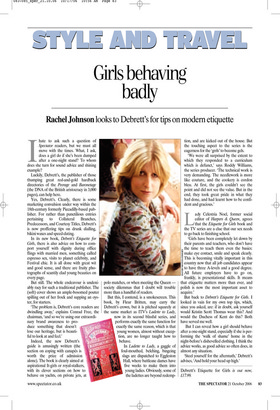Girls behaving badly
Rachel Johnson looks to Debrett’s for tips on modern etiquette Ihate to ask such a question of Spectator readers, but we must all move with the times. What, I ask, does a girl do if she’s been dumped after a one-night stand? To whom does she turn for sound advice and shining example?
Luckily, Debrett’s, the publisher of those thumping great red-and-gold hardback directories of the Peerage and Baronetage (the DNA of the British aristocracy in 3,000 pages), can help here.
Yes, Debrett’s. Clearly, there is some marketing convulsion under way within the 18th-century formerly Piccadilly-based publisher. For rather than punctilious entries pertaining to Collateral Branches, Predecessors, and Courtesy Titles, Debrett’s is now proffering tips on drunk dialling, bikini waxes and speed-dating.
In its new book, Debrett’s Etiquette for Girls, there is also advice on how to comport yourself with dignity during office flings with married men, something called espresso sex, visits to planet celebrity, and Festival chic. It is all done with great wit and good sense, and there are fruity photographs of scantily clad young beauties on every page.
But still. The whole endeavour is undeniably racy for such a traditional publisher. The (soft) cover shows an ample-bosomed pouter spilling out of her frock and supping an oyster, for starters.
‘The problem is, Debrett’s core readers are dwindling away,’ explains Conrad Free, the chairman, ‘and so we’re using our extraordinary brand awareness to produce something that doesn’t lose our heritage, but is beautiful to look at and feel.’ Indeed, the new Debrett’s guide is amusingly written (the section on coping with canapés is worth the price of admission alone). The book is clearly aimed at aspirational It-girls or royal-stalkers, with its clever sections on how to behave on yachts, on private jets, at polo matches, or when meeting the Queen society dilemmas that I doubt will trouble more than a handful of readers.
But this, I contend, is a smokescreen. This book, by Fleur Britten, may carry the Debrett’s crown, but it is pitched squarely at the same market as ITV’s Ladette to Lady, now in its second blissful series, and performs exactly the same function for exactly the same reason, which is that young women, almost without exception, are no longer taught how to behave.
In Ladette to Lady, a gaggle of foul-mouthed, belching, bingeing slags are dispatched to Eggleston Hall, where battleaxe dames have five weeks to make them into young ladies. Obviously, some of the ladettes are beyond redemp tion, and are kicked out of the house. But the touching aspect to the series is the eagerness for the ‘grrls’ to become gels.
‘We were all surprised by the extent to which they responded to a curriculum which is defunct,’ says Roddy Williams, the series producer. ‘The technical work is very demanding. The needlework is more like couture, and the cookery is cordon bleu. At first, the girls couldn’t see the point and did not see the value. But in the end, they took great pride in what they had done, and had learnt how to be confident and gracious.’
DAVID MONTGOMERY
Lady Celestria Noel, former social editor of Harpers & Queen, agrees that the Etiquette for Girls book and the TV series are a clue that our sex needs to go back to finishing school.
‘Girls have been completely let down by their parents and teachers, who don’t have the time to teach them even the basics: make eye contact, smile and speak clearly. This is becoming vitally important in this country now that all job candidates appear to have three A-levels and a good degree. All future employers have to go on, frankly, is presentational skills. It means that etiquette matters more than ever, and polish is now the most important asset to acquire.’ But back to Debrett’s Etiquette for Girls. I looked in vain for my own top tips, which, since you asked, are: if in doubt, ask yourself would Kristin Scott Thomas wear this? And would the Duchess of Kent do this? Both have served me well.
But I can reveal how a girl should behave after a one-night stand, especially if she is performing the ‘walk of shame’ home in the night-before’s dishevelled clothing. I think the advice works, as good advice so often does, in almost any situation.
‘Steel yourself for the aftermath,’ Debrett’s advises, ‘And hold your head up high.’


































































































 Previous page
Previous page